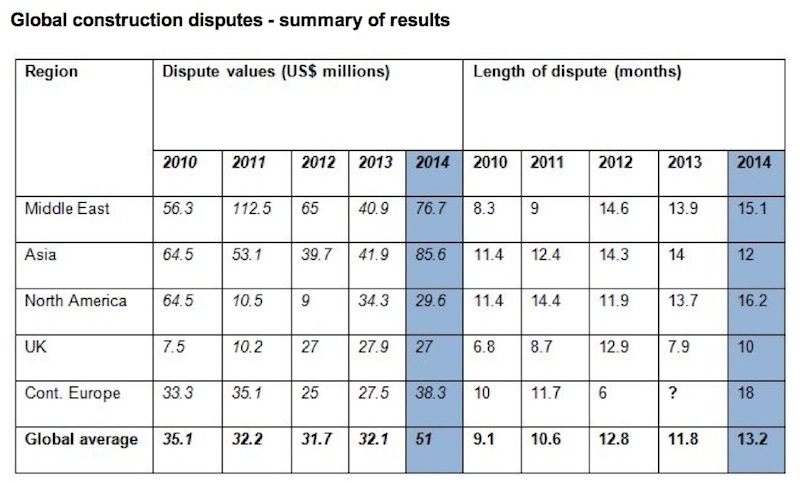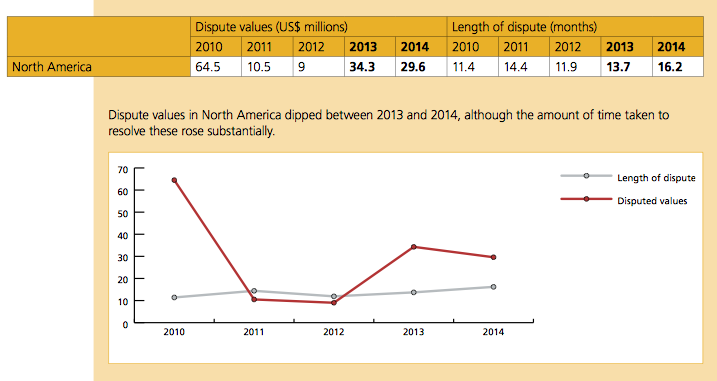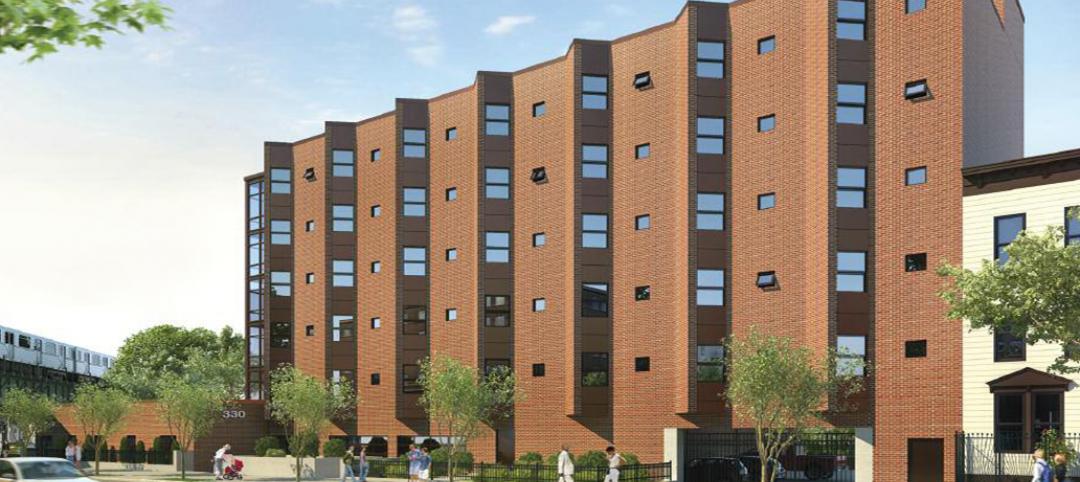For the second consecutive year, the leading cause of construction contract disputes in North America was errors and/or omissions in contract documents. And while the value of disputes fell by nearly 14% in 2014, the time it took to resolve them lengthened substantially last year.
These are some of the key findings in the “Global Construction Disputes Report 2015,” the fifth such annual report produced by Arcadis, a leading global natural and built asset design and consultancy firm. Its data are based on contract disputes handled by Arcadis’ Construction Claims Consulting teams in North America, Europe, the UK, the Middle East, and Asia.
(Arcadis could not provide statistics on the total value of disputes. But last year it served as a claims consultant on approximately 40 disputes with values up to $100 million last year.)
Globally, the report found an increase in the value and length of disputes, with the most common cause being a failure to properly administer the contract. “This is both a revealing and concerning statistic,” observes Mike Allen, Arcadis’ Global Leader of Contract Solutions. “It raises myriad questions as to how projects and programs are briefed, scoped, [and] structured,” as well as questions about resourcing, training, and contracting environment itself.

The transportation sector accounted for 31% of global contract disputes. And despite the presumed advantages of joint ventures, one in three still ends up in a contract dispute, although that number dips to less than one in five (19.8%) in North America.
Worldwide, the average value of disputes increased last year to $51 million, from $32.1 million in 2013. The highest average was in Asia, where dispute values more than doubled to $85.6 million. Arcadis attributed the jump primarily to the region’s growth, the complexity of its construction projects, and the rise in joint ventures.
Dispute values in the Middle East rose to $76.7 million, from $40.9 million in 2013. In the UK, dispute values dipped slightly to $27 million.
The average time taken to resolve disputes globally rose to 13.2 months, up from just under 12 months in 2013. All areas of the world saw their resolution processes extend, with the exception of Asia where the average dispute length took two months less than it did the year before.

In North America, the length of disputes last year increased by more than 18% to 16.2 months. On the other hand, dispute values dipped by nearly 14% to $29.6 million, and there was evident willingness on behalf of contractual parties “to try and try again to arrive at a settlement” and avoid the inevitably escalating costs associated with formal litigation and negative publicity, said Roy Cooper, Arcadis’ Vice President and Head of Contract Solutions in North America.
For the second year running, the most common cause of disputes in North America during 2014 was errors and/or omissions in the contract documents. Differing site conditions came in second, while a failure to understand or comply with contractual obligations on the part of an employer, contractor or subcontractor was the third most commonly cited reason for a dispute.
With North America’s crumbling infrastructure system in need of a significant overhaul, Cooper sees the construction industry moving towards a program of interconnected projects, rather than discrete projects. But big programs can come with bigger risks, so “failure and high visibility disputes are not an option,” he said. “Owners have turned to alternate project delivery, increased project controls and early intervention to mitigate disputes to help manage that risk.”
The three most common methods of Alternate Dispute Resolution in the U.S. were party-to-party negotiation, mediation, and arbitration.
Still, Arcadis predicts that the number of projects going into dispute would to rise this year globally, with projects accepted for lower margins during economic downturns and labor shortages in some markets likely to prove the catalysts for disputes.
Related Stories
| Jul 16, 2012
Reed Construction hires new project manager
Fread is a LEED AP and received his degree from Purdue University.
| Jul 12, 2012
New firm RSK Avanti Partners offers market development services
Full-service consulting firm is focused on working with product manufacturers, designers, specifies and contractors in the building construction market.
| Jul 12, 2012
Chicago Public Schools names Lend Lease team as construction manager
Under this Capital Improvement Program, the Lend Lease team will be responsible for renovation and life safety work at over 100 Chicago Public Schools across the City.
| Jul 12, 2012
Cramer joins Gilbane’s NYC Business Development Team
New Business Development Manager brings over 30 years of experience to Gilbane.
| Jul 12, 2012
EE&K and Knutson Construction selected for the Interchange in Minneapolis
Design-build contract for $79.3 million transportation hub will connect transit with culture.
| Jul 11, 2012
Perkins+Will designs new home for Gateway Community College
Largest one-time funded Connecticut state project and first designed to be LEED Gold.
| Jul 11, 2012
HOK honored with Los Angeles architectural award
42nd annual awards from the Los Angeles Business Council honor design excellence.
| Jul 11, 2012
Skanska relocates its Philadelphia metro office
Construction firm’s new 19,100-sf office targets LEED Gold certification.
| Jul 9, 2012
Modular Construction Delivers Model for New York Housing in Record Time
A 65-unit supportive housing facility in Brooklyn, N.Y., was completed in record time using modular construction with six stories set in just 12 days.
| Jul 9, 2012
Integrated Design Group completes UCSB data center
Firm uses European standard of power at USCB North Hall Research Data Center.
















